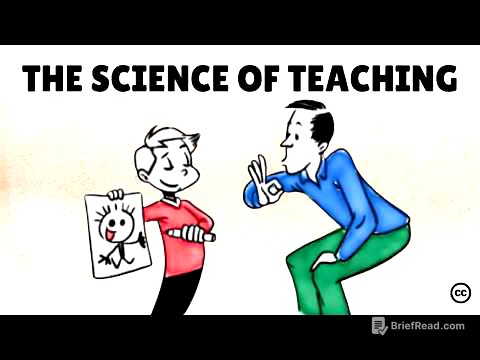TLDR;
This video explores the story of Fritz Haber, a German chemist who revolutionised agriculture and warfare with his discovery of the Haber-Bosch process. This process, which enabled the synthesis of ammonia from atmospheric nitrogen, solved the looming nitrogen crisis of the 19th century, preventing widespread famine and enabling the growth of the global population. However, Haber's legacy is also marred by his involvement in the development of chemical weapons during World War I, including chlorine gas, which resulted in the deaths of thousands of soldiers. The video raises questions about the ethical implications of scientific discoveries and the responsibility of scientists in a world where their inventions can be used for both good and evil.
- Haber's discovery of the Haber-Bosch process revolutionised agriculture by enabling the production of synthetic ammonia, a key ingredient in fertilisers.
- Haber's involvement in the development of chemical weapons during World War I, including chlorine gas, led to the deaths of thousands of soldiers.
- The video raises questions about the ethical implications of scientific discoveries and the responsibility of scientists in a world where their inventions can be used for both good and evil.
The Nitrogen Crisis [0:00]
In the 19th century, the world faced a severe nitrogen crisis. The rapid growth of the human population, particularly in Europe and Asia, led to a shortage of nitrogen, a crucial element for plant growth and human health. Without a solution, crops would fail, leading to widespread famine and potential human extinction. This crisis highlighted the importance of nitrogen in various biological processes, including protein synthesis, oxygen transport, and DNA formation.
Guano: A Bird's Solution [2:30]
To address the nitrogen crisis, the world turned to a peculiar solution: guano, the excrement of seabirds. Guano deposits, particularly those found on islands off the coast of Peru, were rich in nitrogen compounds, including ammonia and nitrates. These deposits became a valuable resource for agriculture, leading to a frenzy of guano extraction and even territorial disputes between nations. The United States even passed the Guano Islands Act in 1856, claiming any guano-rich island not already claimed by another nation. This highlights the crucial role nitrogen played in global agriculture and the lengths to which nations went to secure this vital resource.
The Haber-Bosch Process: A Synthetic Solution [7:21]
Fritz Haber, a German chemist, played a pivotal role in solving the nitrogen crisis. In the early 1900s, he focused on finding a way to synthesise ammonia from atmospheric nitrogen. After years of research and experimentation, Haber successfully achieved this in 1909, using osmium as a catalyst. This discovery, later refined and scaled up by Carl Bosch, led to the development of the Haber-Bosch process, which revolutionised agriculture by enabling the mass production of synthetic ammonia for fertilisers. This process allowed farmers to produce significantly higher yields, contributing to the dramatic increase in global population.
The Dark Side of Haber's Legacy: Chemical Warfare [11:21]
While Haber's discovery of the Haber-Bosch process had a profound positive impact on agriculture, his legacy is also marred by his involvement in the development of chemical weapons during World War I. Haber, a fervent German nationalist, believed that his scientific contributions could help Germany win the war. He led the development of chlorine gas, which was used against Allied troops in 1915, resulting in the deaths of thousands of soldiers. This act, considered a war crime, tarnished Haber's reputation and raised ethical questions about the use of scientific discoveries for warfare.
A Legacy of Controversy: The Nobel Prize and Beyond [14:25]
In 1918, Haber was awarded the Nobel Prize in Chemistry for his work on the synthesis of ammonia. However, this decision was met with widespread criticism, with many condemning the award to a man who had played a key role in the development of chemical weapons. Even Haber's co-recipient of the Nobel Prize declined to accept the award in protest. This controversy highlights the complex and often contradictory nature of scientific progress, where discoveries can have both beneficial and harmful consequences.
The Enduring Impact of Haber's Work [16:14]
Despite the ethical controversies surrounding his life and work, Fritz Haber's legacy remains significant. The Haber-Bosch process continues to be used worldwide, enabling the production of fertilisers that sustain a growing global population. However, the process also has environmental consequences, contributing to greenhouse gas emissions and pollution. The video concludes by reflecting on the complex relationship between scientific progress and its ethical implications, reminding us that the responsibility for the use of scientific discoveries lies with humanity.









